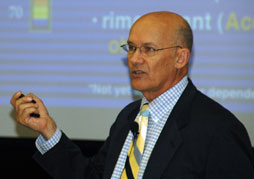By Kelsey Mobbs/reporter

Contrary to what some may believe, dependence or addiction is not necessarily under one’s conscious control, a University of Texas professor said recently on NE Campus.
Sponsored by the NE Campus mental health program, Carlton K. Erickson presented The Science of Addiction April 5 to students, counselors and other professionals.
Addiction has many definitions, Erickson said. It can be a genetic disease, a mental disorder, an addictive disorder or a psychological problem.
“ Alcohol, heroin, cocaine, nicotine, marijuana, prescription drugs, clubs drugs are addictions,” he said. “Gambling, sex, Internet, work, food, cell phones, computer games are also addictions.”
Many myths exist because of a major misunderstanding about addiction, alcoholism and substance abuse, Erickson said. For instance, withdrawals and blackouts are not representative of dependence.
Erickson said dependence and abuse require different treatments.
“ Dependence is a pathological and impaired control over drug use and is an ‘I can’t stop without help’ disease,” he said.
Every drug has a different level of addiction potential because they all connect to the brain differently, Erickson said. Nicotine has the highest level followed by heroin while inhalants have the lowest addiction potential.
Today, the proper diagnosis is available in a verbal or written assessment. In the future, brain scans and genetic testing will confirm what symptoms say.
“ The science of addiction has given us some unique ways of looking at what we think we know,” he said. “Dependence is not a loss of will power; [it is tied in with] a pathological impairment of decision making.”
Therefore, ideas on recovery need to be revisited. Erickson said not everyone agrees on what recovery is.
Some say recovery is a voluntary maintained lifestyle characterized by sobriety, personal health and citizenships.
Erickson said research proves some drugs produce dependence and some people are susceptible to becoming chemically dependent. Therefore, some people recover fully; others recover partially, and some never recover.
Today’s options include 12-step programs, individual and group counseling, harm reduction, motivational interviewing and detoxification medications that enhance abstinence.
“ You don’t have to have cancer to be a cancer researcher,” he said.
Those who attend 12-step meetings become knowledgeable about the addiction treatment methods, Erickson said.
“ New research is changing our understanding of dependence,” he said. “Learning this new information requires a willingness to give up old ideas and learn new ones.”
Erickson has studied the effects of alcohol on the brain for more than 40 years and has published more than 260 scientific and professional articles. He is the co-editor of Addiction Potential of Abused Drugs and Drug Classes and co-author of Your Brain on Drugs and Drugs, The Brain and Behavior.
His new release, The Science of Addiction: From Neurobiology to Treatment, is intended not only for psychologists and counselors but for social workers as well.
Erickson received his bachelor’s degree from Ferris State College and his doctorate in pharmacology from Purdue University.
Currently, he is a professor of pharmacology at the University of Texas at Austin. He has spoken to approximately 80,000 professionals and people in recovery since 1978 and presents workshops to TCC students every two years.
